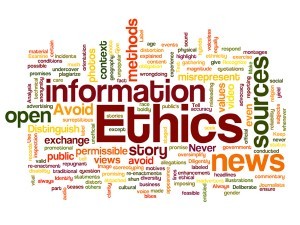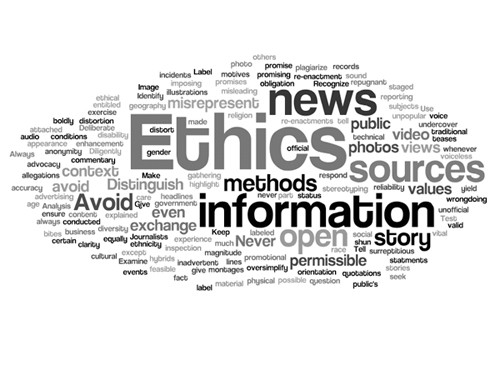By Randall Smith
About five years ago, I was conducting a journalism training session for an overseas newspaper group. They had a comprehensive set of ethics guidelines, and it seemed appropriate to review the most pertinent sections.
“How many of you have read the newsroom’s ethics code?” I asked.
No hands went up.
“How many of you know the key points of the ethics code?”
No hands went up.
The best ethics policy is useless if it sits on a shelf. It’s useless if there’s not regular training. It’s useless if not regularly updated to keep up with the changing times, latest challenges and technology. And, finally, it’s useless if there’s no enforcement.
When I was president of the Society of American Business Editors and Writers in the early 1990s, we had regular meetings where we discussed portions of the ethics policy that’s now a standard part of the SABEW website. The organization continues to have an annual ethics seminar named in honor of the late Gary Klott, a New York Times tax columnist and perhaps SABEW’s greatest ethicist.
The question: How many news organizations do this today?
NO TIME FOR ETHICS?
With crowded schedules, breaking news and reduced manpower, my concern is not enough.
Blogging, tweeting and social networks present temptations to step over the line and post opinions about stories and individuals who are being covered. I’ve seen this happen repeatedly with both the national and foreign press – even though some have strong guidelines on new media.

How do we guard against this?
Obviously, you must have an ethics code. Surprisingly, many have not been updated in years.
Some guidance: Put together a committee that represents every level of the newsroom, and take into account all of the policies that may already be in place on various desks. Make sure the committee agrees, unanimously and strongly, on the end product. Make sure that senior management backs the process with passion.
Educate your staff. Don’t do it every blue moon. Get it done on at least an annual basis.
Ensure that there’s accountability about ethics in annual reviews. Supervisors should go over the ethics code during the review, and require employees to sign a statement that says they’ve received and read the ethics code.
Post your ethics code online. Almost every ethics violation that I dealt with in a 35-year career came about because a member of the public pointed it out to us. Believe it or not, the public cares about this stuff.
Keep your ethics committee active. Offer brown bags to talk to staff about ethics issues that are in the news.
ONE COMPANY
Do not assume that an ethics code stops in the newsroom. The advertising, circulation and business departments most likely need separate codes. They should be tailored in the same way as the newsroom, but include the special features unique to each department.

For example: What is the money handling policy in circulation? What are the ethics of selling advertising in a business category where you are financially involved? Should anyone be allowed to accept free tickets?
Like it or not, the public sees your company as one company. The poor decisions of one person– in the news, circulation or advertising department – reflects on the entire organization.
At the university level, we’re big believers in teaching ethics in the classroom. We’re fortunate to have a number of professors at Missouri who either specialize or have a great deal of expertise in this area.
My feeling is that students can’t hear enough about ethics. They represent a generation that values its privacy, but has put virtually every thought and photo on Facebook. That’s one of the first areas that businesses comb when looking at a future employee.
Whatever you write on the Internet – in Facebook, email or Linked-in – will live forever in some fashion. Do not do anything that you wouldn’t mind sharing with everyone on the front page of some publication. An ethical lapse will follow you around for years.
Credibility takes years to earn, but only minutes to lose.
Guard it carefully.
Randall Smith is the Reynolds Endowed Chair in Business Journalism at the University of Missouri School of Journalism in Columbia.










